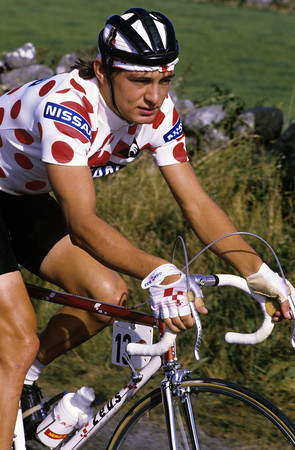
Here’s a question for you; “How many British riders have won a three-week continental stage race?” Here’s a clue: the answer isn’t “none”.
In 1988, 23 year-old Cayn Theakston from Worcester who never had a day’s coaching in his life, fought and won in one of the toughest arenas in Europe to claim the 19-stage Volta a Portugal, overcoming crashes, mountains, horrendous roads and even combines within his own team to record a win which is remembered in Portugal to this day.
Grab a coffee for this one – it’s a bit long but a great read…
* * *
It took Theakston 69 hours 8 minutes and 20 seconds to carve his name into the history books, to put that into perspective, Russian Vasily Zdanov won the Milk Race the same year in 47:37:18 over 12 stages.
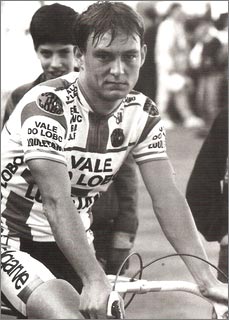
Theakston’s win was no flash in the pan, rather the product of a long gestation period; some four seasons in fact.
He first rode and finished the race in 1985 with only illness preventing a top ten finish. The following year he returned to hold the yellow jersey for 10 days [Theakston is no archivist and he remembers it as 11 days, however, the records show 10] but a stray dog caused a crash on the penultimate day taking down a large part of the field including yellow jersey Theakston who landed in hospital.
Despite more time in yellow in 1987, it was not to be third time lucky for the climber from Worcester who crashed out of the race on the same stretch of road as he had in the year previous.
It was to be 1988 before he did what no British rider before or since has ever done and pulled-on the final yellow jersey in a three week continental bike race.
It’s a long way to the Algarve
But it’s a long unlikely journey from the West Country to The Algarve, how did the odyssey begin? The man himself explains in his soft, laid-back voice;
“The Algarve connection came about through the ANC team, I was on a training camp with them on the Algarve at the start of 1985 and they asked me to guest with the team in Tour of the Algarve but Joey McLaughlin was chucked off the race for fighting with another rider and the team withdrew in protest.
“I had been noticed by a local team manager though and he invited me back to guest for the Louletano-Val de Lobo squad in the Tour of Portugal. I just wasn’t used to the diet – it was steak all the time and on the last stage I had terrible diarrhoea, but for that I would have finished in the top ten.
“In 1986 they invited me back and I was in the jersey for 11 days. I was in yellow with two days to go when a dog brought a load of guys off and I ended up in hospital.”
A slight diversion
I asked Theakston what the race was like;
“The roads were so bad that you wouldn’t believe.
“One day we were behind the lead car going down this track, it was maybe a little worse than usual but none of the riders even gave it a thought.
“All of a sudden the car stopped, we were in a farm yard, the commissaire was in to visit a relative, we all had to turn around and ride back to the proper route.
“At some of the mountain-top finishes the crowds were incredible, just like you see at the Tour on TV.”
On the strength of this ride Theakston won a contract with Spanish-registered but French-managed team Fagor – Robert Millar, Sean Yates, Malcolm Elliot, Martin Earley and Stephen Roche all appeared on its books at some stage.
Theakston rode Paris-Brussels for them at the end of 1986 and finished 57th behind big Italian Guido Bontempi [Carrera]. A good ride in the first stage of the Nissan Classic in Ireland had him the journalists’ note books again.
Through driving snow…
The 1987 season however started in a much less promising way.
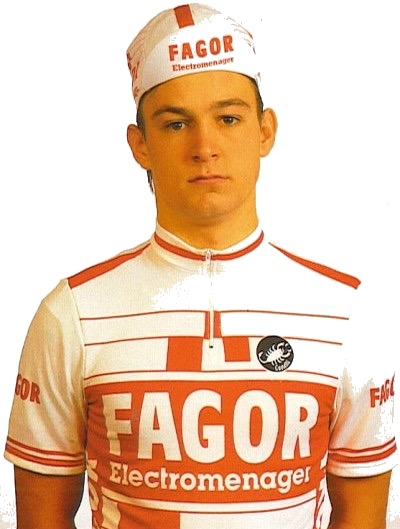
Theakston was to present himself at the Fagor pre-season training camp and team presentation in San Sebastian in northern Spain, travelling with team mates Martin Earley [Ireland] and Sean Yates [England].
The weather had other ideas – Europe was in the grip of a heavy snow fall, flights were being cancelled across the board. Yates as an experienced professional and possessed of a relaxed out-look on life, simply went home.
Anxious not to make bad first impressions, Earley and Theakston battled to the Basque Country by way of alternative flights and taxi cabs. Theakston takes up the story;
“When we got there the team clothing hadn’t arrived, the Castelli lorry was stuck in the snow in the mountains somewhere. Fortunately I had plenty of clothing with me, but Martin didn’t and struggled.
“In our first race, the Etoile des Besseges the weather was really bad, I was the last rider to go back to the team car to take on extra clothing, when I got back there I found they handed out all my kit to other riders – the organization was terrible.
“I was down to ride Tirreno – Adriatico but had no race programme for three weeks so I went back to England to train. I got a fax when I got home saying that they had fired me for going back without permission.
“Fagor released my contract from the UCI without too much trouble and I got a contract to race in Portugal again with Louletano – Val de Lobo. Loule was the town [approx. 20 kilometres from Faro, capital of the Algarve], Val de Lobo were property developers.
“The deal was that if the town allowed the developers to build then the developers had to help the town; they sponsored the town football, athletics and cycling teams.
“In the 1987 Volta I held the jersey for a few days and it looked like I was going to win but I crashed and ended-up in hospital again.”
In 1988 Theakston was in good form, winning two stages in the Semana Algarve and the overall in the GP O Jogo, but the jewel in the crown was the Volta. It was not a straightforward route to victory, though. He takes up the story again;
“There was one mountain stage with a summit finish; the guy who won the stage lived there, he was a real local hero and there were huge crowds out to see him.
“As well as the stage win they gave him my yellow jersey, but he hadn’t gained enough time on me to take it, my manager lodged a protest and one of the race officials took him aside and said; ‘If you want us to get off this mountain alive he better keep that jersey!’ I got it back in the time trial without difficulty.
“During the last stage my own team attacked me constantly; we had a rider in the squad called Marco Chagas who won the Volta four times during his career and he wanted his friend Joaquim Gomes [eventually third that year, he would win in 1989 and 1993] to win, he was on the team too and they attacked me relentlessly.
“I held them off though and at the finish I was too happy to be angry.”
”Cayn-Mania”
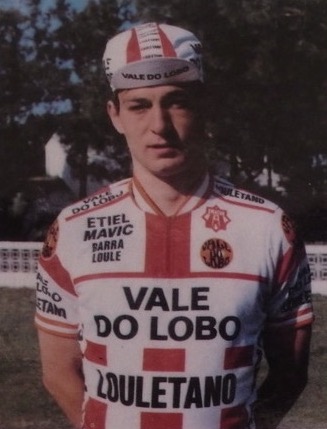
He didn’t know it at the time but it was to be his finest hour, he recalls;
“I got a huge welcome at the airport when I flew back to the Algarve, somehow the Portuguese people liked me, they really took me to their hearts.”
Theakston was not the only English rider in the Volta; Mike Twelves and Nigel Bishop both rode on the back of good Milk Race results [sixth and fourteenth respectively], taking up an Algarve semi-pro team’s request to the British Cycling Federation for ‘two good riders to ride the Tour of Portugal, all expenses paid.’
Twelves recalls;
“It was a different attitude to racing there, they didn’t really care about amateurs and professionals, you just rode – consequently there was a huge disparity in abilities from guys like Thierry Bourguignon who rode the Tour three times and the Fagor pro team with John Carlsen down to ordinary amateurs.
“The field was huge, 160 riders, the roads weren’t so good, and they just went mad from the gun; I’d raced in Spain and France but I had never experienced anything like it, for the first two hours of each stage you were flat-out on the drops and thinking; “this has to ease up soon,” it was just crazy.
“There was no hierarchy in the peloton, in the Milk Race everybody knew what would happen and that the real race would take place in the last 30-40 miles but in Portugal there were attacks flying about everywhere, it was mental.
“Nigel and I both crashed out in the first week, there were people falling off everywhere, some of the pros looked like walking scabs, they must have been crashing and just getting straight back on the bike.
“I crashed three or four times and hurt my knee badly, I started the next stage to see if it would ease-off but it didn’t and I had to pack.”
Twelves speaks in respectful tones about Theakston’s abilities as a rider and climber in particular;
“The team we were riding for was based in Loule too and we went out training with Cayn prior to the race, he was a very lightly-built guy any way but he was in such good shape on the hills.
“He took us up these climbs like you can’t imagine, one of them was a mountain he used as a training reference, half way up I thought; ‘I haven’t got the gear to get up this thing.’ He just flew up it… the other thing was that he could really turn himself inside out – that was no easy win.”
No small praise from a man who had been battling with the Russians at the Milk Race.
Back in the Algarve
In 1989 Theakston returned to the Algarve and a new contact, but the roller-coaster ride that was his career was on the way down again.
“I got my new bike and I know it sounds crazy but I didn’t keep notes about my position, I just jumped on the bike the way it was, I was always like that I never had any advice about that kind of thing.
“I began to get pains in my calf and eventually I discovered I had torn a calf muscle because my position wasn’t right. Once I had recovered from that I obviously wasn’t in the best of form because I hadn’t done the training. I was riding a race in the Algarve and I said to the management that I just wasn’t going well; they said I needed vitamins – I took the “vitamins” and won the next stage!”
B Sample? What B Sample?
“The manager came to me after I came off the podium and said; ‘We might have a little problem with the control’ [drug test] and sure enough I failed.
“In those days there was a certain sum you paid to a certain someone for the B sample to vanish [both samples have to test positive, no second sample = no positive], the sum was paid and my sample duly disappeared.
“Before the Volta I said to the team management that I simply didn’t have the form to win, they stopped my salary immediately and sent me bills for the medical attention they had given me when I had the calf problems.
“I just left, but they messed me about a lot with the release of my contract from the UCI, eventually I got the paperwork through and signed with ADR and won a stage of the Sun Tour in Australia for them.”
Theakston also won the mountains prize and was sixth overall and, but for being sent off course he could well have won overall.
It looked like Theakston’s career was back on track but the ADR team folded before the 1990 season started amid tales of unpaid bills and salaries.
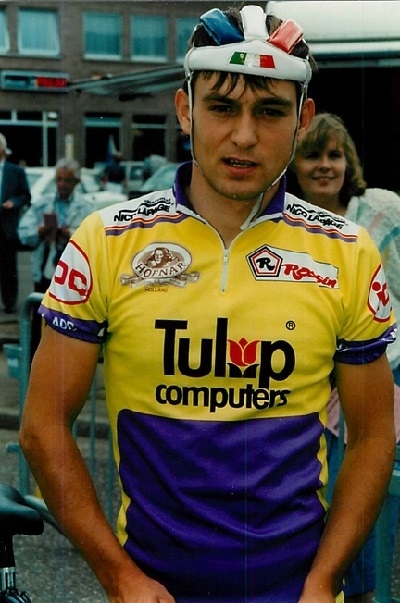
Originally a Spanish firm, Paternina was to pick up the pieces left behind by ADR but pulled out because they were not going to be given a ride in the Tour of Spain.
Eventually IOC-Tulip became sponsors and Theakston was joined by fellow Englishman, world professional pursuit champion Colin Sturgess.
The team was made up of riders trying to break into the pro ranks and riders in the twilight of their career such as ex-Tour green jersey winner, Frank Hoste.
Theakston took his last professional win with the team, an outstanding prologue victory in an acrobatic and hilly Milk Race prologue, beating Joey McLoughlin by six seconds.
That was the highlight of the year as Theakston became all too aware of the cut-throat world of Belgian pro bike racing.
He picks up the story;
“I was in plaster early in the season after an operation to finally sort-out my calf problems but virtually as soon as the plaster was off they had me racing again.
“The way they looked at it was that if you were on a Belgian team and not racing you were wasting a team place that a Belgian guy could have.
“That Milk Race was part of a block of racing where I started 23 times in 24 days.”
In addition, the team was firmly rooted in the drug-culture of the day, he remembers;
“Myself and the two Norwegians in the team [Thorjus Larsen and Bo-Andre Namtvedt] just wouldn’t touch the stuff but the Belgians took that as insult and wouldn’t accept us, there was a pretty heavy drug ethic in the squad.”
A particular incident sticks in his mind;
“One of the young Belgian guys in the team died [Patrice Bar], he went to bed one night and didn’t wake up.
“The team were all at the service in the church; when we left the church it was a long walk to the graveside, the two Norwegians and me were walking in the cortege behind the coffin when the team car with the Belgian guys went flying past, it was the most disrespectful thing I’ve seen in my life.”
By the end of the season Theakston had picked-up tendonitis and his contract was not renewed, however he did organize a deal with a Portuguese squad, but it was all over, as he recalls;
“My wife didn’t want to come to Portugal and I didn’t want to be away from my son, besides I hadn’t had a proper wage packet in two years.”
He was just 26.
Theakston now runs a thriving contract-cleaning business in Cheltenham, were he lives with second wife Sheena and his two children. He’s not a man who lives in the past, but I have to ask anyway, regrets?
“I could have made a lot more cash out of the game, I met John Carlsen [Fagor, who held the yellow jersey early in the 1988 Volta] when I was in Belgium with ADR, we worked out his contract in Sterling and I couldn’t believe the money he was making.
“The main one though is that I never reached my full potential as a stage race rider, I think my best years were still to come.”
Theakston may be unheralded in his home land but not so on the Algarve as he explains;
“They’ve built a new sports centre in Loule, my 1988 Volta-winning bike is in a glass case with a plaque giving details of my win, it was a big deal for the town and they haven’t forgotten me.”
Neither have some of us back home, Cayn.



